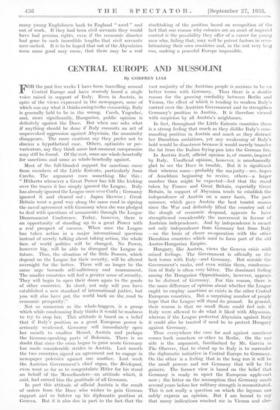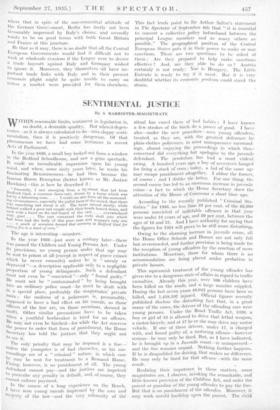CENTRAL EUROPE AND MUSSOLINI
By GODFREY LIAS
FOR the past live weeks I have been travelling around Central Europe and have scarcely beard a single voice raised in support of Italy. Even in Austria, in spite of the views expressed in the newspapers, none of which can say what it thinks owing to the censorship, Italy is generally held to be in the wrong. Czech, Yugoslav, and, more significantly, Hungarian, public opinion is definitely against the Duce. But when one asks what if anything should be done if Italy commits an act of unprovoked aggression against Abyssinia, the unanimity disappears. The more cautious say they prefer not to discuss a hypothetical case. Others, optimists or pre- varicators, say they think some last-moment compromise may still be found. Of the rest, some are whole-heartedly for sanctions and some as whole-heartedly against.
Most of the full-blooded support for sanctions came from members of the Little Entente, particularly from Czechs. The arguMent runs something like this : " Hitherto whenever a Great Power has felt like kicking over the traces it has simply ignored the League. Italy has already ignored the League once over Corfu ; Germany ignored it and cleared out ; Japan likewise ; Great Britain went a good way along the same road in signing the naval agreement with Germany when she was pledged to deal with questions of armaments through the League Disarmament Conference. Today, however, there is an opportunity of standing up to a great Power with a real prospect of success. When once the League has taken action in a major international question instead of merely talking about taking action, the whole face of world politics will be changed. No Power, however big, will be able to disregard the League in future. Thus, the situation of the little Powers, which' depend on the League for their security, will be altered overnight for the better. There will no longer be the same • urge towards self-sufficiency and rearmament.
The smaller countries will feel a greater sense of security. They will begin to open their doors again to the goods of other countries. In short, not only will you have established a new standard of international justice, but you will also have put the world back on the, road to economic prosperity."
Not so numerous as the whole-hoggers, is a group which while condemning Italy thinks it would be madness to try to stop her. This attitude is based on a belief that if Italy's position as a great European power is seriously weakened, Germany will immediately open her mouth to swallow Memel, Austria and perhaps the German-speaking parts of Bohemia. There is no doubt that since the crisis began to grow acute Germany has made considerable strides in Austria. Last month the two countries signed an agreement not to engage in newspaper polemics against one another. Last week the Austrian Government's chief organ, the Reichspost, even went so far as to congratulate Hitler for his stand on behalf of the Memellanders—an attitude which, it said, had earned him the gratitude of all Germans.
In part this attitude of official Austria is the result of orders from the Duce who wishes to gain German support and so bolster up his diplomatic position at Geneva. But it is also due in part to the fact that the vast majority of the Austrian people is anxious to be on better terms with Germany. Thus there is a double reason for the growing cordiality between Berlin and Vienna, the effect of which is tending to weaken. Italy's control over the Austrian Government and to strengthen Germany's position in Austria. It is therefore viewed with suspicion by all Austria's neighbours.
In fact, throughout the Little Entente countries there is a strong feeling that much as they dislike Italy's com- manding position in Austria and much as they distrust her Danubian ambitions, yet any weakening of Italy's hold would be disastrous because it would merely transfer the fat from the Italian frying-pan into the German fire.
In Austria itself, official opinion is, of course, inspired by Italy. Unofficial opinion, however, is unashamedly glad to see the Duce in trouble. But it is significant that whereas some—probably the majority—see. hopes of Anschluss beginning to revive, otherS—a larger number than might be expected—feel that the stand taken by France and Great Britain, especially Great Britain, in support of Abyssinia tends to establish the independence of Austria on a surer basis. The past summer, which gave Austria the best tourist season since the War and definitely lifted the country out of the slough of economic despond, appears to have strengthened considerably the movement in favour of Austrian independence. And by independence is meant not only independence from Germany but from Italy —on the basis of closer co-operation with the other Danubian countries which used to form part of the old Austro-Hungarian Empire.
Hungary, like Austria, views the Geneva crisis with mixed feelings. The Government is officially on the best terms with Italy—and Germany. But outside the Government's ranks, and even within them, condemna- tion of Italy is often very bitter. The dominant feeling among the Hungarian Oppositionists, however, appears to be distrust of Germany. For this reason, there is the same difference of opinion about whether the Leag.ue ought to employ sanctions as exists in the other Central European countries. But a surprising number of people hope that the League will stand its ground. In general, their reason is that no small State could feel safe if Italy were allowed to do what it liked with Abyssinia, whereas if the League protected Abyssinia against Italy it could also be trusted if need be to protect Hungary against Germany.
Thus everywhere the case for and against sanctions comes back somehow or other to Berlin. On the one side is the argument, familiarised by Mr. Garvin in The Observer, that to stand up to Italy is to surrender the diplomatic initiative in Central Europe to Germany. On the other is a feeling that in the long run it will be the small powers and not Germany that will be the gainers. The former view •is based on the belief that Germany is ready to upset the European apple-cart now ; the latter on the assumption that Germany needs several years before her military strength is reconstituted. This is not really a question on which the layman can safely express an opinion. But I am bound to say that many indications reached me in Vienna and else- where that in spite of the non-committal attitude of the Germain Goveliment, Berlin 'has firstly not ' been' favourably impressed by Italy's claims, and secondly wants to 'be. on good terms with both Great Britain and France at this juncture. Be that as it may, there is no doubt that all the Central European GovernMents would find it difficult not to wink at wholesale evasions if the League were to decree a trade boycott against Italy and Germany , wished • to ignore it.. Moreover,- they -themselves -all have im- portant trade links with Italy and in their present economic plight might be quite unable to carry on unless . a market were provided for them elsewhere. This fact lends point to Sir Arthur Salter's statement in The Speetatoi- of September 6th that " it is essential to concert a collective policy beforehand between the principal Leagner members and as many others as' possible." The geographical position of the Central European States puts it in their power to make or mar sanctions. There are two questions to be asked of them : Arc they prepared to help make sanctions effective ? And, are they able to do so ? Austria certainly is not ready; Nor is Hungary. The Little Entente is ready to try if it must. But it is very deMbtful whether its economic position could stand the strain.















































 Previous page
Previous page